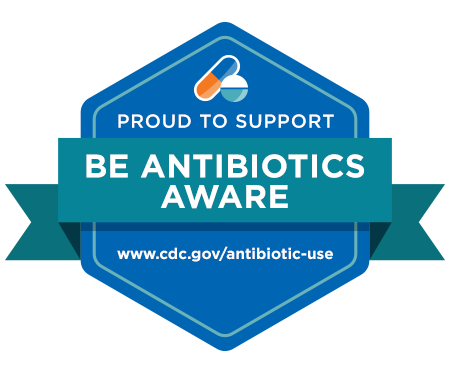SEE ALSO:
Infectious Diseases and Outbreaks
Infection Prevention
Communicable Disease
NEED HELP?
Having trouble finding what you are looking for? Use our A to Z Index.
Antimicrobial Resistance/Antibiotic Stewardship
What is Antimicrobial Resistance?
Antibiotics are medicines used to prevent and treat bacterial infections. Antimicrobial resistance occurs when the medicines used to treat all types of infections, including bacteria, fungi and parasites no longer work. When microorganisms (i.e. bacteria, fungi, viruses, and protozoa) develop antimicrobial resistance they are sometimes called "superbugs". When the medicines become ineffective, infections will persist in the body, increasing the risk of spreading the infection to others.
Learn more about CDC: Antimicrobial Resistance
What is Antimicrobial Stewardship?
Per the Infectious Diseases Society of America: "Antimicrobial stewardship refers to coordinated interventions designed to improve and measure the appropriate use of antimicrobials by promoting the selection of the optimal antimicrobial drug regimen, dose, duration of therapy, and route of administration. Antimicrobial stewards seek to achieve optimal clinical outcomes related to antimicrobial use, minimize toxicity and other adverse events, reduce health care costs for infections, and limit the selection for antimicrobial resistant strains."
Antimicrobial Stewardship Toolkits
CDC's Core Elements of Antibiotic Stewardship provides facilities and providers a set of guiding principles to improve antibiotic use and outcomes of patients. There is no single approach to optimize antibiotic use in all settings.
- Core Elements of Antibiotic Stewardship for Nursing Homes
- Core Elements of Hospital Stewardship Programs
- Core Elements of Outpatient Antibiotic Stewardship
- Implementation of Antibiotic Stewardship Core Elements at Small and Critical Access Hospitals
- The Hospital Pharmacist's Guide to Antimicrobial Stewardship Programs
- Strategies for Superbugs: Antibiotic Stewardship for Rural Hospitals
Antibiotics Awareness Week
U.S. Antibiotic Awareness Week (USAAW) is an annual observance that raises awareness of the threat of antibiotic resistance and the importance of appropriate antibiotic use. Learn more about this observance and our Antibiotic Awareness Campaign from our HAI News and Events.
Infection Prevention and Antimicrobial Stewardship Education
- Educational Resources: Association of Professionals in Infection Control and Epidemiology
- CIDRAP's Antimicrobial Stewardship Project provides current, accurate, and comprehensive information on the topic and works to build an online community to address leading issues.
- CDC: Nursing Home Infection Preventionist Training
- CDC's Infection Control Training
Antimicrobial Stewardship Report
Additional Resources
For Providers
- Robert Wood Johnson Foundation: Conversations around Antibiotics with your Patient: An Interactive Video!
- CDC train for Antibiotic Stewardship for Providers
- AHRQ: Four Moments of Antibiotic Decision-Making in Antibiotic Prescription
- Antibiotic Resistance Threats in the United States, 2019
For Patients
- APIC: The ABC's of Antibiotics
- CDC: Antibiotics Aren't Always the Answer
- APIC: Role of Infection Preventionists and Patients in Antibiotic Stewardship
One Health Initiative
Page last updated: January 29, 2026
SEE ALSO:
Infectious Diseases and Outbreaks
Infection Prevention
Communicable Disease
NEED HELP?
Having trouble finding what you are looking for? Use our A to Z Index.




